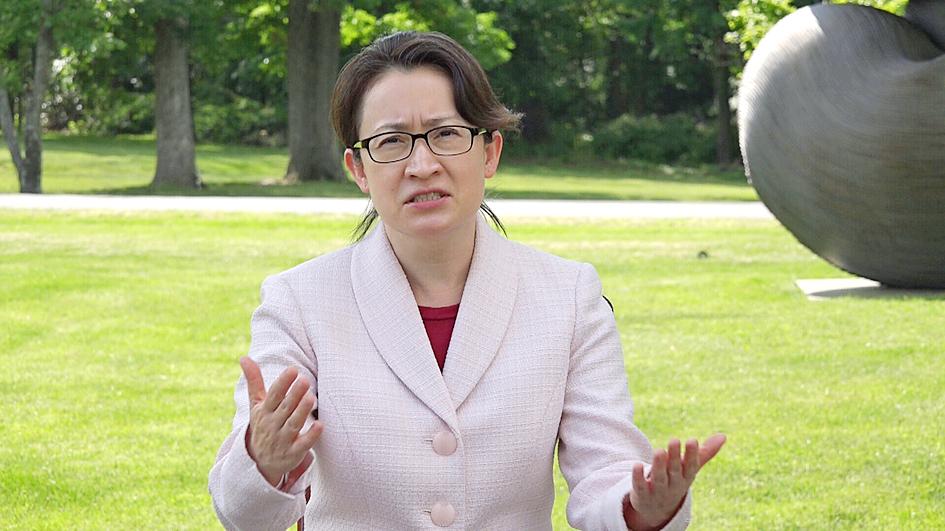Taiwan is willing to partner with members of the Quadrilateral Security Dialogue (Quad) and can play an important role in addressing key issues that the group hopes to tackle, Representative to the US Hsiao Bi-khim (蕭美琴) said on Thursday.
The Quad was to hold its first in-person summit yesterday.
The issues — climate change, COVID-19, the restructuring of supply chains and regional security — are Taiwanese interests, Hsiao told India’s Tv9 Telugu, which identified her as “Taiwan ambassador” to the US.

Photo: CNA
Taiwan seeks to establish partnerships with Quad member states, and other like-minded nations in the region, to address these issues, she added.
Taiwan and India have many common interests on which they could collaborate, such as technology and manufacturing, she said.
They could also work together on vaccine manufacturing, as India has demonstrated its resilience to the COVID-19 pandemic with its robust vaccine production, she said.
Asked about Taiwan’s “secret” to resisting China, Hsiao said that Taiwan just wants to survive and that its democracy had been hard-won with many sacrifices.
Taiwan has created a strong economy backed by legal institutions, and has also performed well in technology and other sectors, she said.
Taiwanese love freedom, and want to survive and defend that freedom, she said, adding that it is not looking for a fight, but wants to freely interact with other nations.
US-Taiwan relations are “rock solid”, and both nations share similar values and interests, such as democracy and liberty, as well as the safety and economic prosperity of the Indo-Pacific region, Hsiao said.
Bilateral ties have improved greatly over the past few years, as the nations collaborate on economic and security issues and support democracy, she said.

SECURITY: As China is ‘reshaping’ Hong Kong’s population, Taiwan must raise the eligibility threshold for applications from Hong Kongers, Chiu Chui-cheng said When Hong Kong and Macau citizens apply for residency in Taiwan, it would be under a new category that includes a “national security observation period,” Mainland Affairs Council (MAC) Minister Chiu Chui-cheng (邱垂正) said yesterday. President William Lai (賴清德) on March 13 announced 17 strategies to counter China’s aggression toward Taiwan, including incorporating national security considerations into the review process for residency applications from Hong Kong and Macau citizens. The situation in Hong Kong is constantly changing, Chiu said to media yesterday on the sidelines of the Taipei Technology Run hosted by the Taipei Neihu Technology Park Development Association. With

CARROT AND STICK: While unrelenting in its military threats, China attracted nearly 40,000 Taiwanese to over 400 business events last year Nearly 40,000 Taiwanese last year joined industry events in China, such as conferences and trade fairs, supported by the Chinese government, a study showed yesterday, as Beijing ramps up a charm offensive toward Taipei alongside military pressure. China has long taken a carrot-and-stick approach to Taiwan, threatening it with the prospect of military action while reaching out to those it believes are amenable to Beijing’s point of view. Taiwanese security officials are wary of what they see as Beijing’s influence campaigns to sway public opinion after Taipei and Beijing gradually resumed travel links halted by the COVID-19 pandemic, but the scale of

A US Marine Corps regiment equipped with Naval Strike Missiles (NSM) is set to participate in the upcoming Balikatan 25 exercise in the Luzon Strait, marking the system’s first-ever deployment in the Philippines. US and Philippine officials have separately confirmed that the Navy Marine Expeditionary Ship Interdiction System (NMESIS) — the mobile launch platform for the Naval Strike Missile — would take part in the joint exercise. The missiles are being deployed to “a strategic first island chain chokepoint” in the waters between Taiwan proper and the Philippines, US-based Naval News reported. “The Luzon Strait and Bashi Channel represent a critical access

Pope Francis is be laid to rest on Saturday after lying in state for three days in St Peter’s Basilica, where the faithful are expected to flock to pay their respects to history’s first Latin American pontiff. The cardinals met yesterday in the Vatican’s synod hall to chart the next steps before a conclave begins to choose Francis’ successor, as condolences poured in from around the world. According to current norms, the conclave must begin between May 5 and 10. The cardinals set the funeral for Saturday at 10am in St Peter’s Square, to be celebrated by the dean of the College